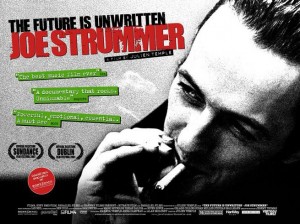JOE STRUMMER: THE FUTURE IS UNWRITTEN: 3 ½ STARS
 Joe Strummer was the embodiment of punk rock even though he was the polar opposite of what the punk movement stood for. As the leader of The Clash his edgy good looks and charisma made him a star in a culture that treated celebrity with contempt. He squatted in London’s abandoned homes but came from a privileged background, with a father who was a career diplomat. He moved The Clash away from punk’s do-it-yourself ethos, skillfully crafting ambitious and interesting songs; and for a movement whose rallying cry was “No Future” he created music that more than twenty-five years on still sounds rebellious and fresh.
Joe Strummer was the embodiment of punk rock even though he was the polar opposite of what the punk movement stood for. As the leader of The Clash his edgy good looks and charisma made him a star in a culture that treated celebrity with contempt. He squatted in London’s abandoned homes but came from a privileged background, with a father who was a career diplomat. He moved The Clash away from punk’s do-it-yourself ethos, skillfully crafting ambitious and interesting songs; and for a movement whose rallying cry was “No Future” he created music that more than twenty-five years on still sounds rebellious and fresh.
In other words he was a paradox, but it was this contradictory nature that made him one of the most exciting and unpredictable musical figures of the twentieth century. In Joe Strummer: The Future is Unwritten director Julien Temple presents the facts of his life, told by those who knew him best.
Temple, best known as the director of the outrageous Sex Pistols’ film The Great Rock ‘N’ Roll Swindle uses Strummer’s friends and associates—most of whom are seated around a giant campfire, reminiscing and playing music—and beautifully edited montages to paint an intimate portrait of a man many thought they knew, but few really did.
But this isn’t a typical big screen bio. Although it is told in a linear straightforward fashion, Temple uses his visual flair to punctuate each of the pieces of Joe’s life. For instance when the Sex Pistols burst on to the scene they were, arguably, punk rock’s big bang, so Temple accompanies the Pistol’s footage with an explosion. He uses stock footage and clips from Animal Farm the way Strummer used his guitar—with a rambunctious power that is guaranteed to grab your attention.
What holds your attention, however, is the spirit of Strummer, which is infused onto every frame of the film. We see him at various stages of his life, from round-faced “boarding school bully” to long haired art student to sneering punk rocker through to chunky elder statesman with voice clips from his radio show London Calling and various interviews providing the soundtrack.
As cantankerous and confounding a character as Strummer was in life, (he died in 2002 at age 50) his overriding love of life and people shines through. “Without people we’re nothing,” he says near the end of the film. Sounds more like hippie-speak than the words of one of punk rock’s most famous sons, but there you have it, yet another contradiction.
